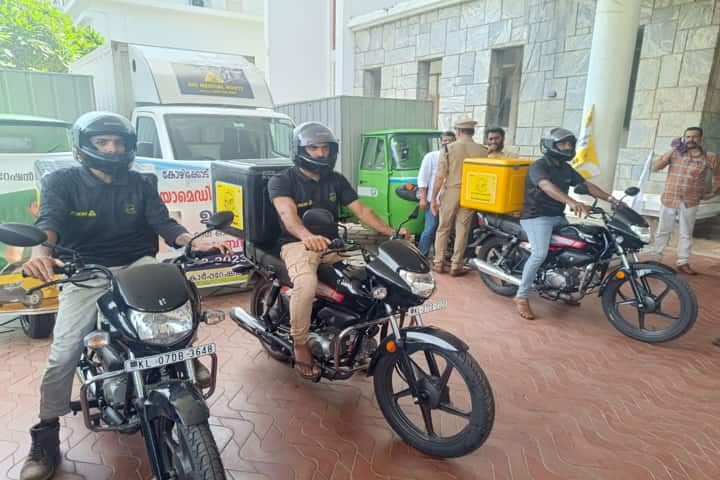

Aakri a Kochi-based start-up has started door-to-door pick up of biomedical waste in Kozhikode in collaboration with the city's municipal corporation
While modern medicine and its methods are indispensable, the waste generated by them is of huge quantum and its proper disposal is vital to avoid all kinds of pollution. While Government agencies at different levels are tackling this, there are private players too like Aakri, a waste management start-up powered by tech in Kerala.
Today Aakri launched its service in Kozhikode Calicut in collaboration with the city’s municipal corporation. It was inaugurated by Dr. Beena Philip, Mayor of the city. There will be door-to-door collection of biomedical waste and this facility will be provided to each and every household in 75 of its divisions. “We have started the operation with three e-autos and four motorbikes which will visit one set of divisions once a week between Monday to Friday. The family units desirous of using this facility will have to use our app which is available on Google or App play store and provides us details and requirements,” C. Chandrashekhar, CEO of Aakri told India Narrative.
He added that the waste collected will be delivered to the facility of Kerala Enviro Infrastructure Limited (a public limited company) for disposal in Kochi within 48 hours. “It is stipulated in the law that this type of waste should be disposed of within 48 hours,” the CEO informed.
Aakri will charge Rs.45 per kilogram for the waste along with 12 per cent as GST. “The below poverty line families don’t have to pay, as their charges will be subsidized by the civic body,” Chandrashekhar said.
Incidentally, this is the third municipal corporation which has tied-up with Aakri out of a total of six in Kerala. Others are Kochi and Thrissur. Besides these corporations, of 84 municipalities, 15 including Kalamassery and Thrikkakara are collaborating with the start-up as are seven panchayats too. “This month will also start work with Kannur Municipal Corporation,” the CEO disclosed to India Narrative.
In Kochi, the civic body has given a mandate to the firm to collect biowaste from 74 wards under its jurisdiction. “Here also the collection is every ward once a week. For example, collection day for divisions 1 to 10 and 24 to 28 is Monday. This is rushed to KEIL. We charge Rs.12 per kilogram of waste from the household while KMC provides a subsidy of Rs.33 per kg. At KEIL it is segregated and properly treated for disposal.”
Aakri chose KEIL which has a capacity to treat 16 tonnes but in the past was underutilized as the waste could not be delivered to the facility. This is where the start-up stepped in. The only other facility, IMAGE, is run by the Indian Medical Association.
“We approached the KMC with the proposal of collecting and delivering the waste. In the beginning we collected merely 20 kg. Within a span of 12 months, the collection increased and today it is 2,500 kg a day. We are the only authorized firm in the city to do this,” the CEO told India Narrative.
Biomedical waste is generated from households, healthcare activities, such as hospitals, clinics, and laboratories. Elaborating on this, Chandrashekhar told IN: “Improper handling and disposal of this can pose significant risks to public health and the environment. Unfortunately, unscientific methods are still followed in India, which can have severe consequences. These include open burning releasing toxic fumes in the air, harming human and animal health and environment; dumping in the open like landfills without proper segregation or treatment which can cause spreading of infectious diseases; and reuse of waste like gloves, syringes and needles which is illegal and can cause diseases.”
These methods can result in severe consequences like spread of infectious diseases, contamination of water sources, and soil and air pollution. Its ill effects include respiratory problems, cancer, and birth defects.
When asked why he chose biomedical waste as the focus area, the CEO said he was “always passionate about starting a social impact venture that would create an impact on society and which will solve a real life problem.” He added that the “biomedical waste management sector has been a major concern in recent years,” and that he had “been working on developing a solution to address this issue.”
Having worked in this field, Chandrashekhar feels that the way forward to handle biomedical waste in the proper manner requires “raising awareness, strengthening collaboration, infrastructure optimization and monitoring and enforcement.”
India's Garden Reach Shipbuilders and Engineers Limited (GRSE) has signed a Memorandum of Understanding (MoU)…
French Foreign Trade Minister Laurent Saint-Martin on Tuesday reaffirmed the "conviction" that France is one…
Chief of Defence Staff (CDS) General Anil Chauhan delivered a special lecture on 'Future Wars…
Corporate performance of Indian companies in the fourth quarter of financial year 2025 remained satisfactory…
Beijing sent two aircraft carrier strike groups and numerous warships to the waters both north…
Prime Minister Narendra Modi on Tuesday spoke to Assam Chief Minister Himanta Biswa Sarma, Sikkim…